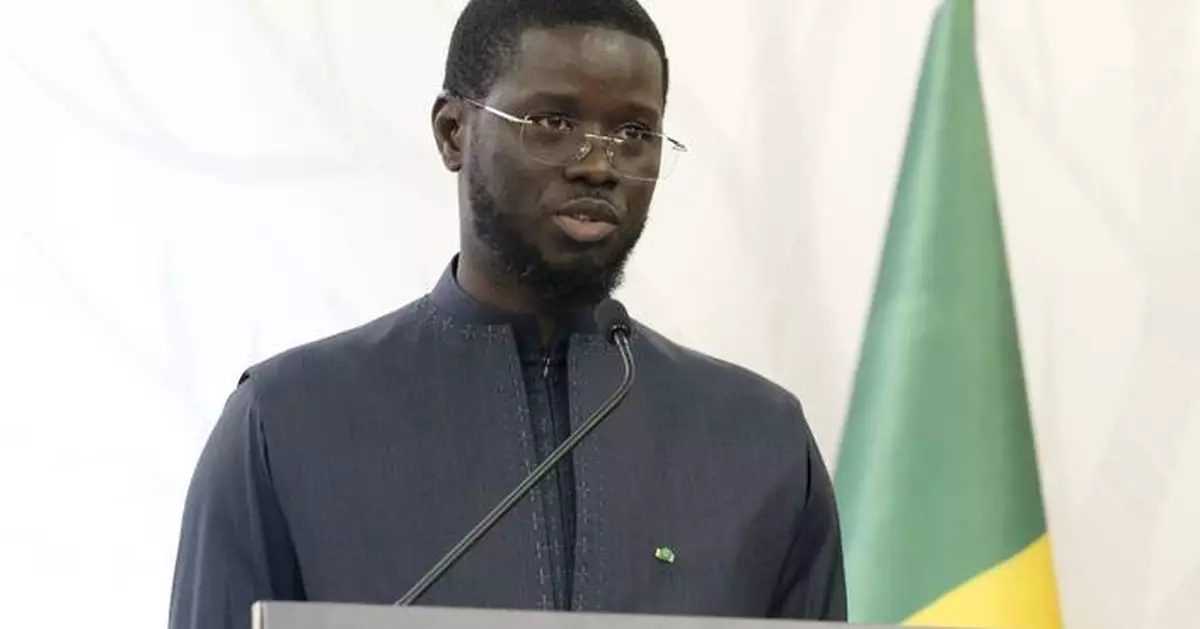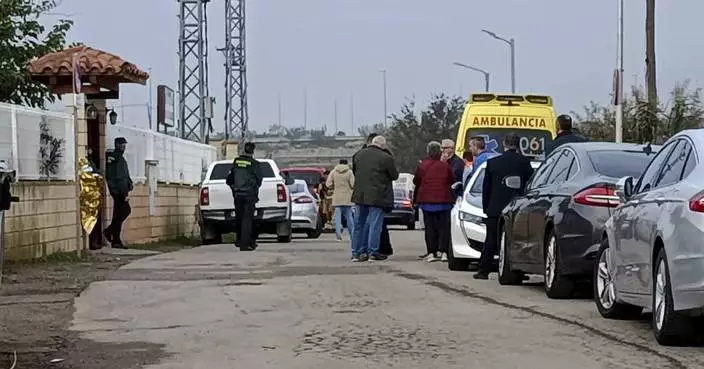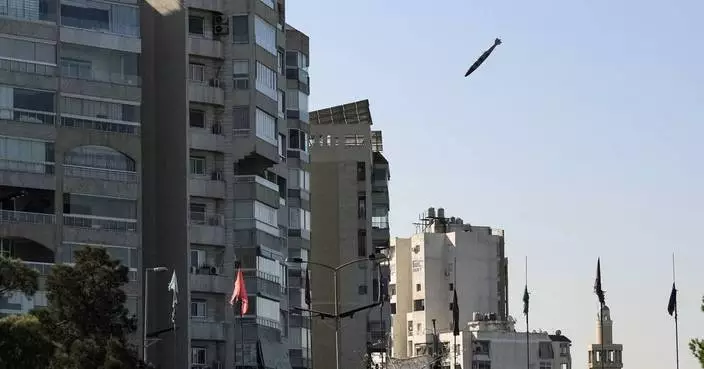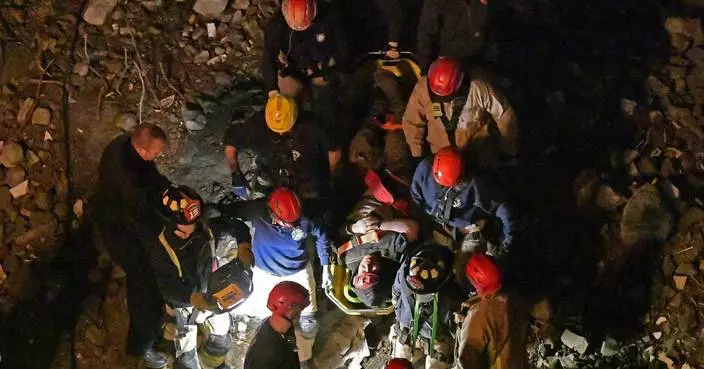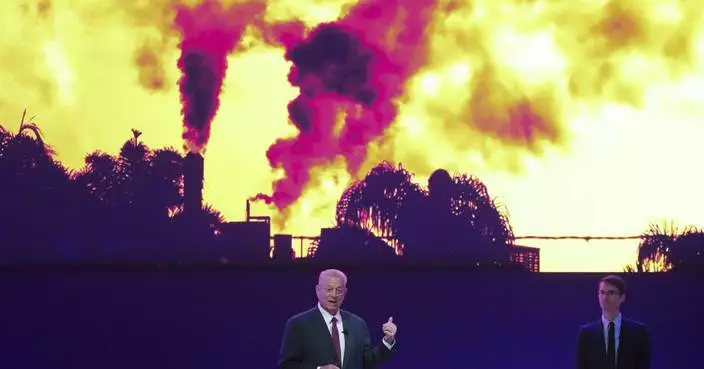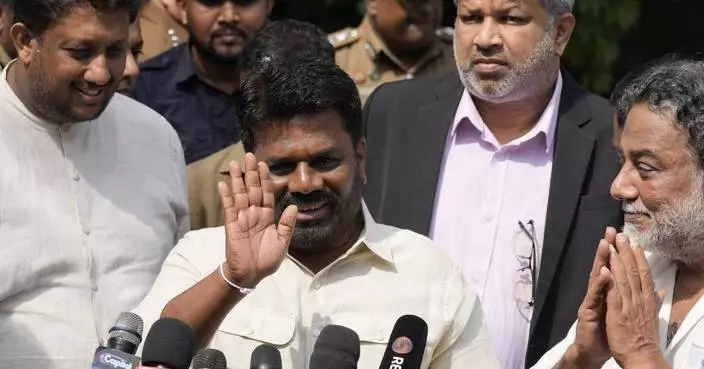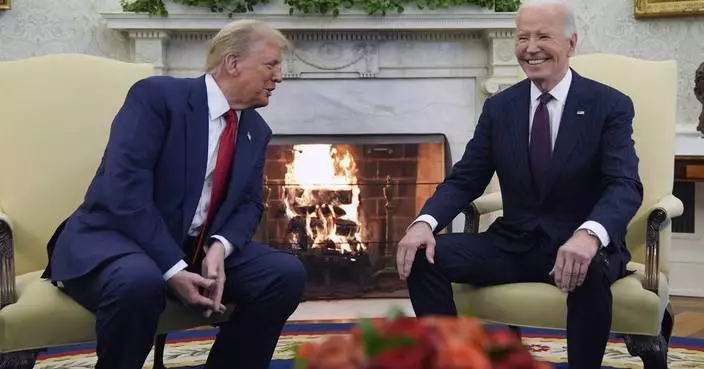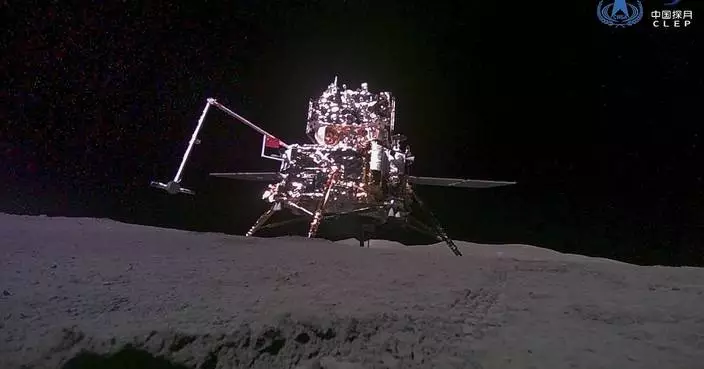DAKAR, Senegal (AP) — Politicians in Senegal wrapped up a tense electoral campaign on Friday ahead of a key legislative election this weekend that's set to determine if the country's newly-elected president can carry out ambitious reforms.
Voters in Senegal will on Sunday choose 165 lawmakers in Senegal's assembly, where the party of President Bassirou Diomaye Faye currently does not hold a majority.
Faye, who was voted in in March on an anti-establishment platform, said that has blocked him from executing the reforms he pledged during his campaign, including fighting corruption, reviewing fishing permits for foreign companies, and securing a bigger share from the country’s natural resources for the population.
In September, he dissolved the opposition-led parliament, paving the way for a snap legislative election. His party is facing the Takku Wallu opposition platform led by former President Macky Sall.
The campaign for the legislative election was marked by sporadic clashes between different party supporters. Clashes erupted between supporters in central Senegal in recent weeks and the headquarters of an opposition party were set on fire in the capital Dakar, the ministry of the interior said Monday.
On Tuesday, Ousmane Sonko, the country’s prime minister and a popular opposition figure who helped catapult Faye to victory, denounced attacks against supporters of his party PASTEF in Dakar and other cities.
“May each patriot they have attacked and injured, be proportionally avenged. We will exercise our legitimate right to respond,” he wrote on X, before back-pedalling and asking his supporters to remain peaceful in a speech later that day.
Last month Sonko's vehicle was attacked with stones as clashes broke out between his supporters and unidentified attackers while he was campaigning in Koungueul, in the center of the country. The leader of an allied party, former minister Malick Gackou, had his arm broken in the incident, according to local media.
The presidential election in March tested Senegal’s reputation as a stable democracy in West Africa, a region rocked in recent years by coups and attempted coups.
Both Faye and Sonko were released from prison less than two weeks before the vote following a political amnesty announced by outgoing President Macky Sall. Their arrests had sparked months of protests and concerns that Sall would seek a third term in office despite term limits. Rights groups said dozens were killed and about 1,000 were jailed.
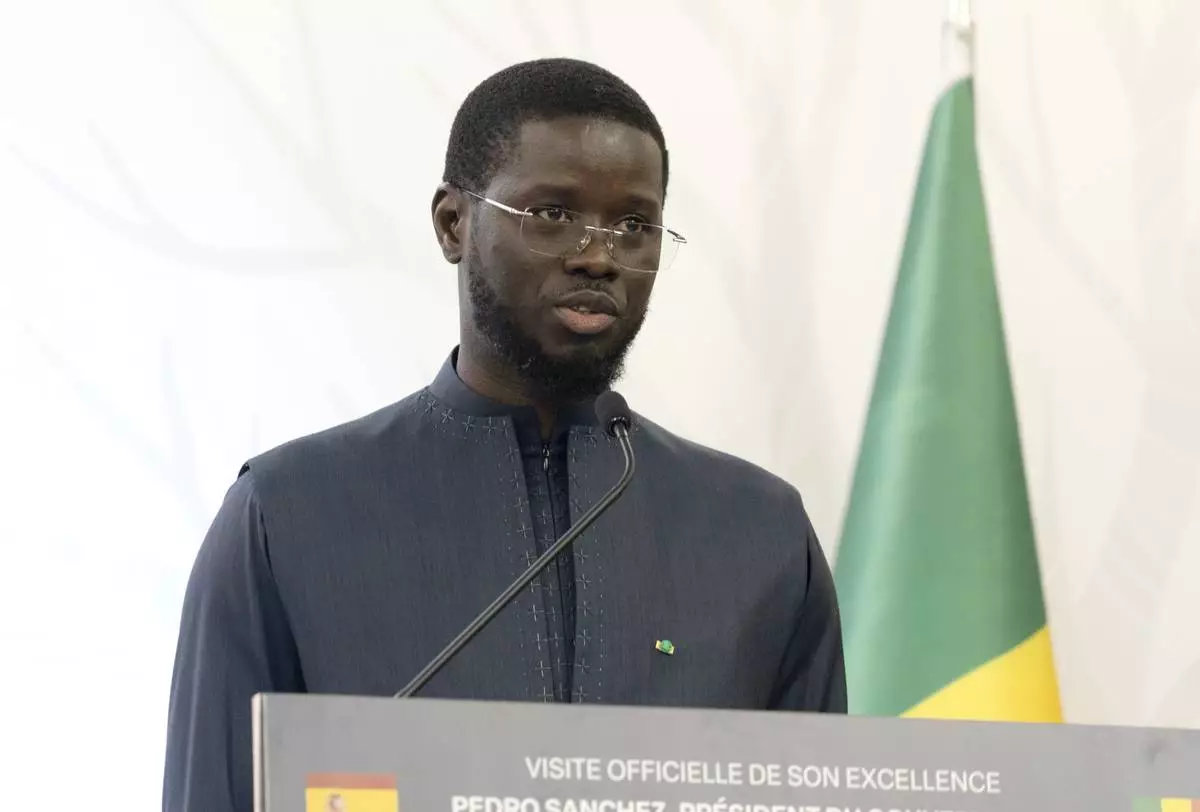
FILE - Senegal's President Bassirou Diomaye Faye attends a press conference in Dakar, Senegal, Aug. 29, 2024. (AP Photo/Annie Risemberg, File)
BAKU, Azerbaijan (AP) — In the nosebleed seats of a nearly-empty Baku Olympic stadium coated with a layer of dust, activists used a giant banner to beam the words “Pay Up” to the world.
The protest took weeks of thought and planning, with activists pitching the location as somewhere bigger and more visually striking. But with the stands being outside the main venue, most of the attendees at this year's U.N. climate talks didn't see or hear it — except for maybe some in the COP29 presidency offices right below. The majority of the people involved in deciding the financial future of climate action at the talks remained in the sprawling venue, under white tarps with no windows.
It’s “really hard to make our demands heard,” said Bianca Castro, a climate activist from Portugal. She’s been to several COPs in the past and remembers years when there were thousands of protestors in the streets, and a multitude of strikes and actions throughout the event. But at the stadium's seats, they were told exactly where and when they could stand and chants were restricted. A United Nations climate change spokesperson said that “actively facilitating an advocacy action of this sort — in a part of the venue that isn’t open to participants .... involved extensive dialogue among the participants, facility managers and health and safety officers.”
Still, Castro said the difficulty of making an impact meant many are "losing hope in the in the process."
People involved in protests say they have felt a trend in recent years of stricter rules from the United Nations organizers with COPs being held in countries whose governments limit demonstrations and the participation of civil society. And some community spaces for prepping and organizing have had to resort to going underground because of security concerns. But the U.N. Framework Convention on Climate Change — who run the COPs — say the code of conduct that governs the conferences has not changed, nor has the way it's applied, and COP29 organizers say there's space across the venue for participants to “make their voices heard in line with the UNFCCC code of conduct and Azerbaijan law safely and without interference.”
Despite the challenges and what some see as a depressing mood, activists say it remains a critical time to speak up about the historical and present-day injustices that are in desperate need of money and attention.
It's especially true this year at a COP where the theme is finance, because voices from the Global South play a pivotal role in bringing ambitious demands to the negotiating table, said Rachitaa Gupta, who coordinates a global network of organizations advocating for climate justice. But she said that there have been more and more defamation rules each year that prohibit protestors from calling out specific countries or names.
“We do feel that the restrictions have reached a stage where it’s a constant battle on what we can say,” Gupta said. Activists can’t name specific countries, people or businesses in line with the UNFCCC’s code of conduct.
Meanwhile, across town in a downtown Baku building, activists paint, snip fabric and sculpt with cardboard and papier-mache in a quest for visually compelling symbols of climate action. The art space was once a place of community, where people came to pour their feelings into a creative outlet, said Amalen Sathananthar, coordinator at a collective called the Artivist Network. But now his team keeps the art space private and doesn't reveal its location because of security concerns.
Restrictions, though, can breed creativity among the artists designing the banners, flags and props that demonstrators use during protests. In the absence of naming specific people or countries, or carrying country flags, they instead have to come up with other imagery to get their messages across.
One of this year’s pieces was a larger-than-life snake for an action with the slogan “Weed Out the Snakes,” calling attention for the removal of big polluters and fossil fuel lobbyists at climate talks, something that's been “outrageous,” said Jax Bongon, whose organization is part of the Kick Big Polluters Out coalition. “Would you invite an arsonist to put out the fire?”
It's an issue that's "particularly hard for me as someone from the Philippines,” Bongon added, but called it "really uplifting" to watch the action come together.
Demonstrators hoisted the fire-colored serpent with on their shoulders and heads. Together, their hisses filled the tent, bringing the snake to life.
“I think that the only reason people dare to do this is because, one, they're struggling on how to be heard,” said Dani Rupa, one of the artists working in Baku with The Artivist Network. “But, two, that there is like creative support for them to be able to do this.”
The Artivist Network have been doing this for a long time, attending COPs unofficially since the early 2000s and officially since they formalized in 2018. Sathananthar's seen the multitude of ways protestors have had to argue with host countries and the UNFCCC governing body to get space for activism. But this year, especially, he said it's a struggle — “negotiations within negotiations” that have had Sathananthar staying up late into the night in talks and on occasion have left him “fuming.”
A spokesperson for UNFCCC said they've “been a recognized global leader in ensuring safe civic spaces at COPs for many years" which normally doesn't happen at other intergovernmental events.
Still, activists feel that only being able to protest within certain areas throughout the venue — when previous years have seen mass street marches in host cities — can be frustrating.
“Every action you now have to fight for desperately," Sathananthar said. “We fought to get these spaces and we will fight to keep them."
Follow Melina Walling on X at @MelinaWalling. Follow Joshua A. Bickel on X and Instagram.
The Associated Press’ climate and environmental coverage receives financial support from multiple private foundations. AP is solely responsible for all content. Find AP’s standards for working with philanthropies, a list of supporters and funded coverage areas at AP.org.
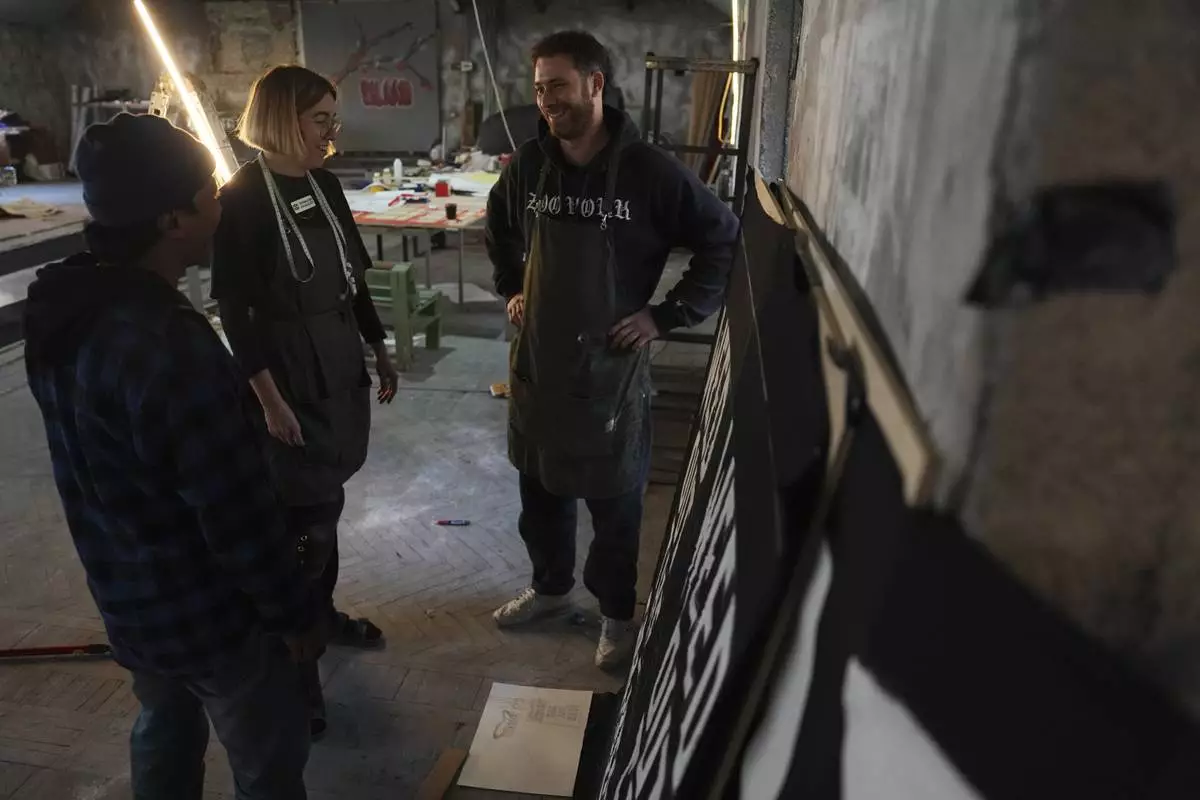
Shaq Koyok, of Malaysia, from left, Anna Varszegi, of Budapest, Hungary, and Dani Rupa, of Budapest, Hungary, laugh while working on a banner during the COP29 U.N. Climate Summit, Thursday, Nov. 14, 2024, in Baku, Azerbaijan. (AP Photo/Joshua A. Bickel)
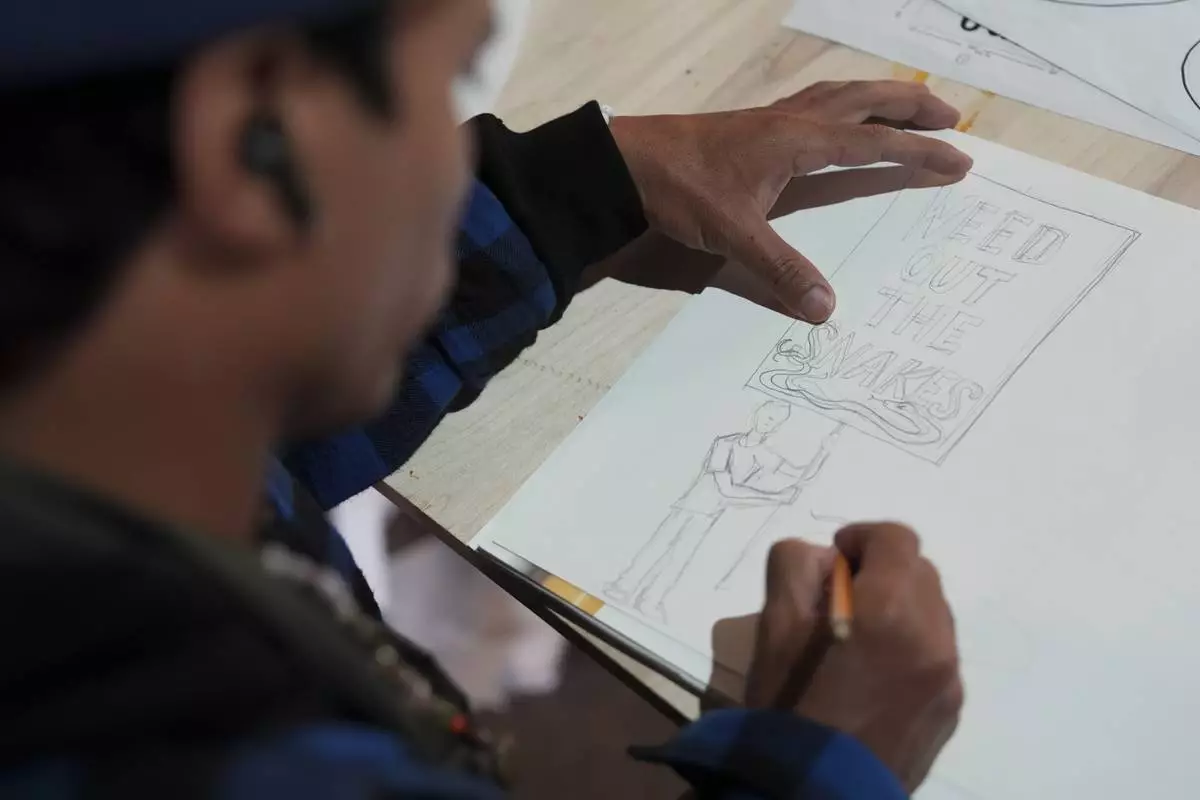
Shaq Koyok, of Malaysia, sketches during preparations ahead of a demonstration during the COP29 U.N. Climate Summit, Thursday, Nov. 14, 2024, in Baku, Azerbaijan. (AP Photo/Joshua A. Bickel)
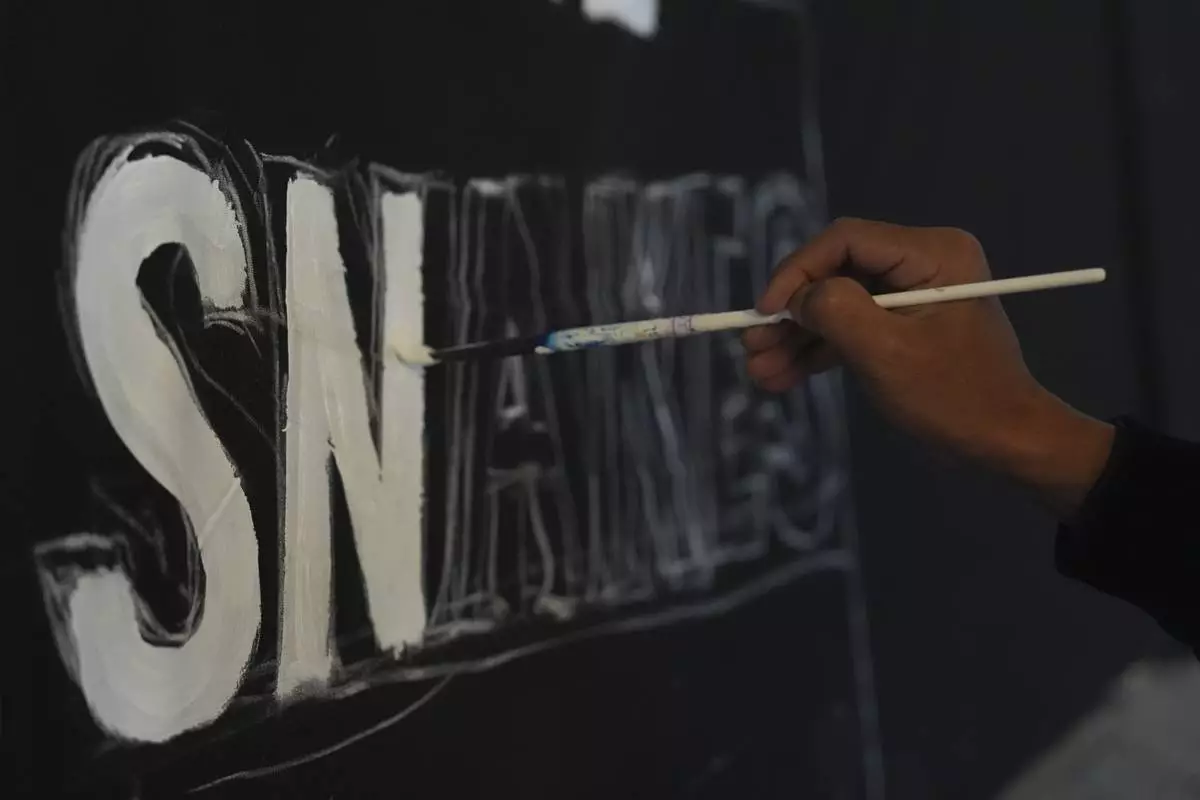
Shaq Koyok, of Malaysia, paints a sign ahead of a demonstration during the COP29 U.N. Climate Summit, Thursday, Nov. 14, 2024, in Baku, Azerbaijan. (AP Photo/Joshua A. Bickel)
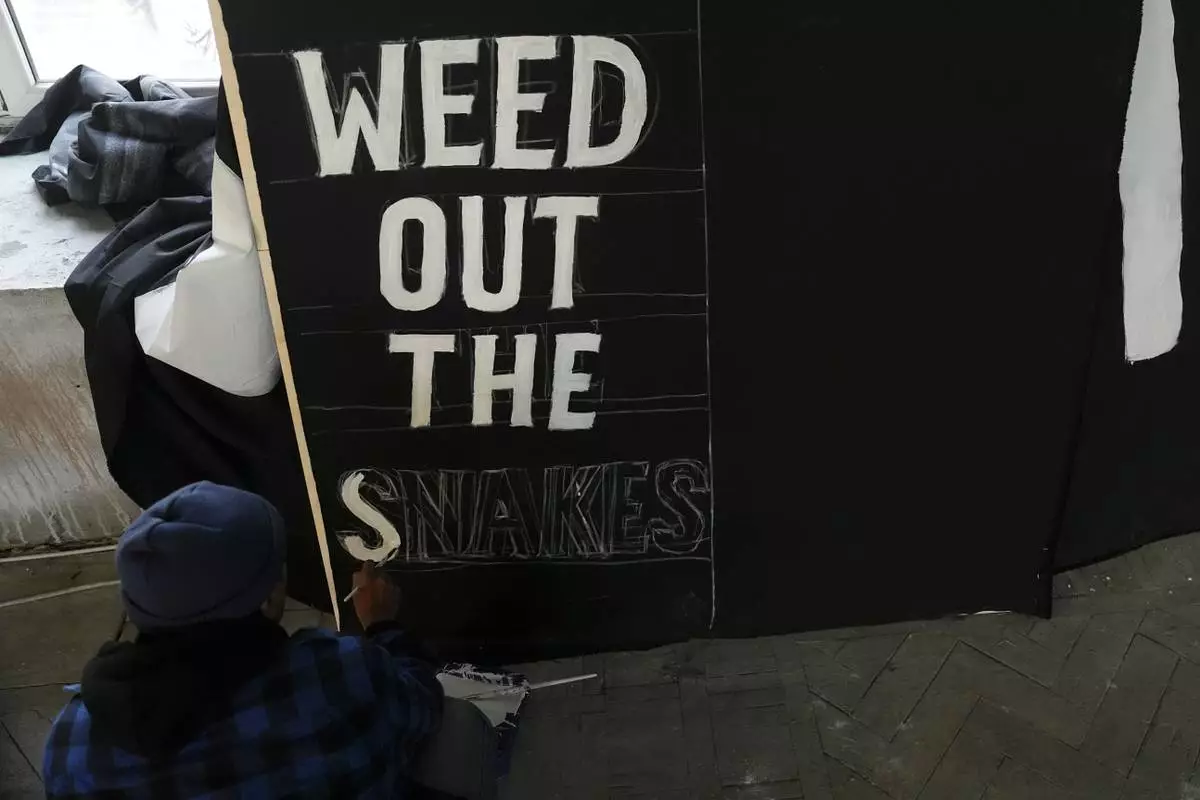
Shaq Koyok, of Malaysia, paints a sign ahead of a demonstration during the COP29 U.N. Climate Summit, Thursday, Nov. 14, 2024, in Baku, Azerbaijan. (AP Photo/Joshua A. Bickel)
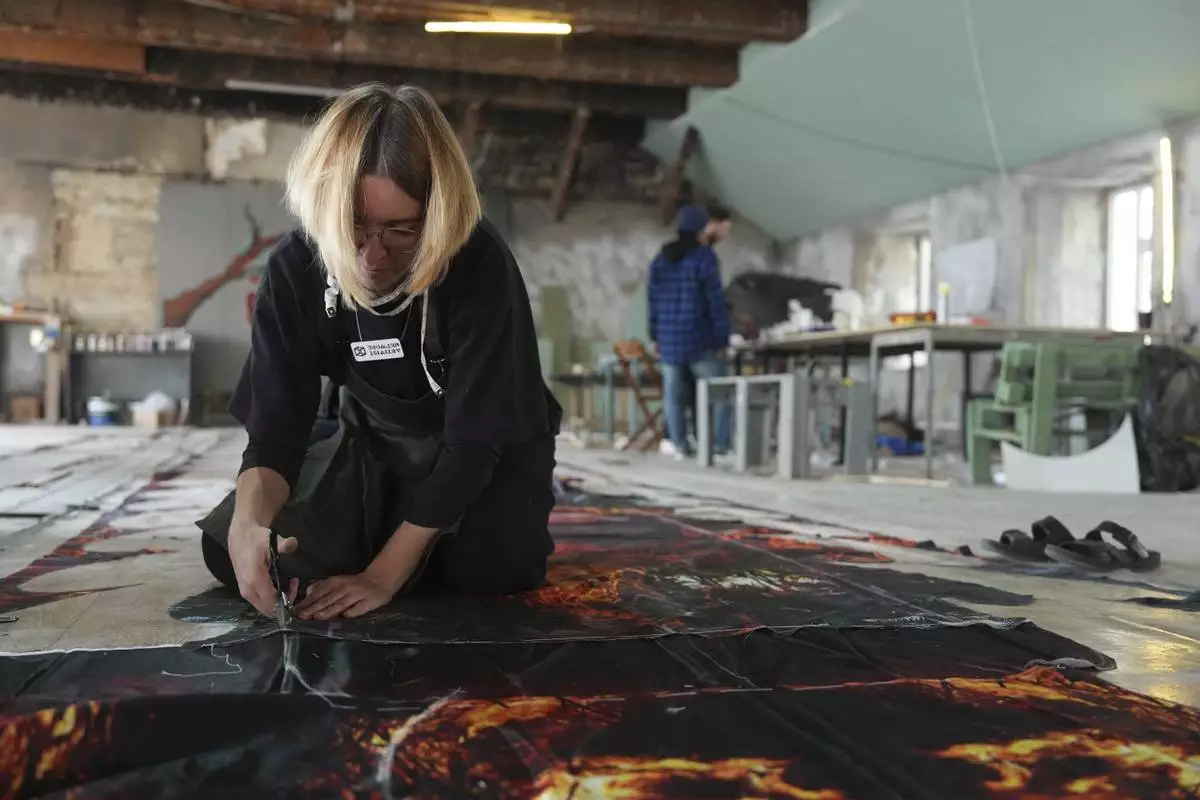
Anna Varszegi, of Budapest, Hungary, works on preparations for a demonstration during the COP29 U.N. Climate Summit, Thursday, Nov. 14, 2024, in Baku, Azerbaijan. (AP Photo/Joshua A. Bickel)
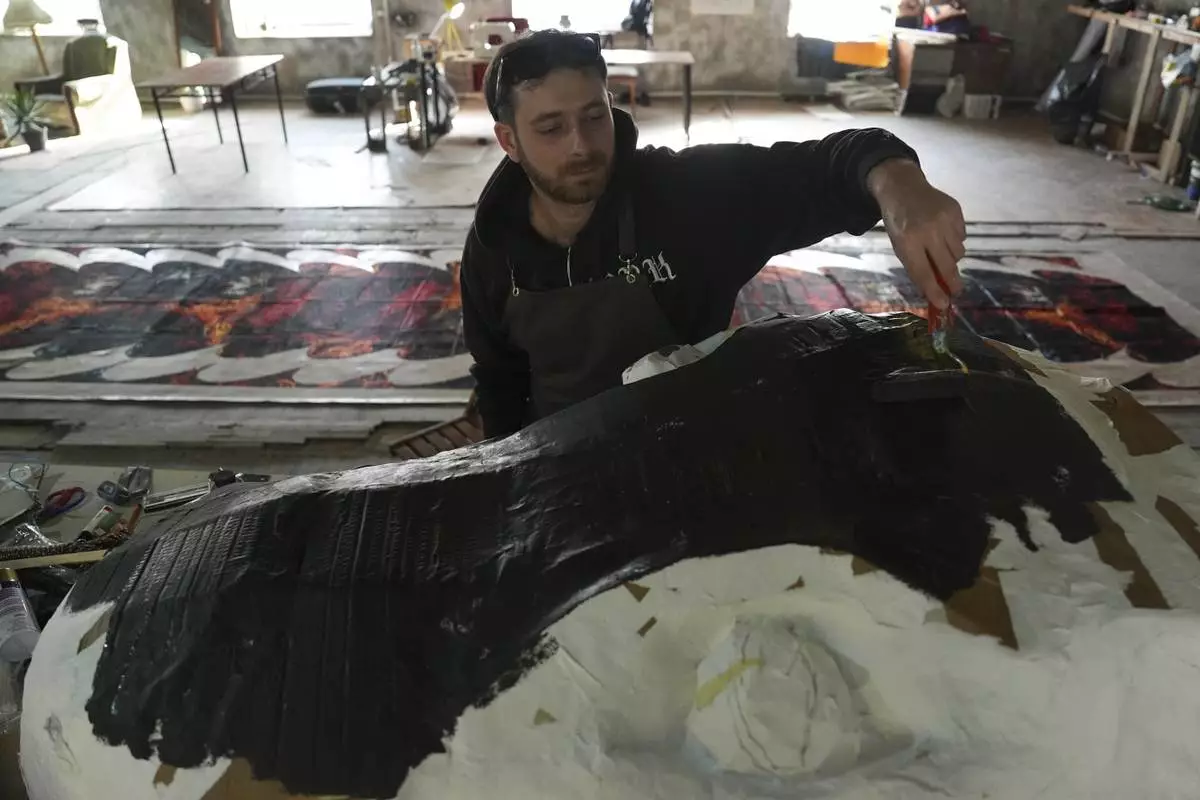
Dani Rupa, from Budapest, Hungary, paints a snake for a demonstration during the COP29 U.N. Climate Summit, Thursday, Nov. 14, 2024, in Baku, Azerbaijan. (AP Photo/Joshua A. Bickel)
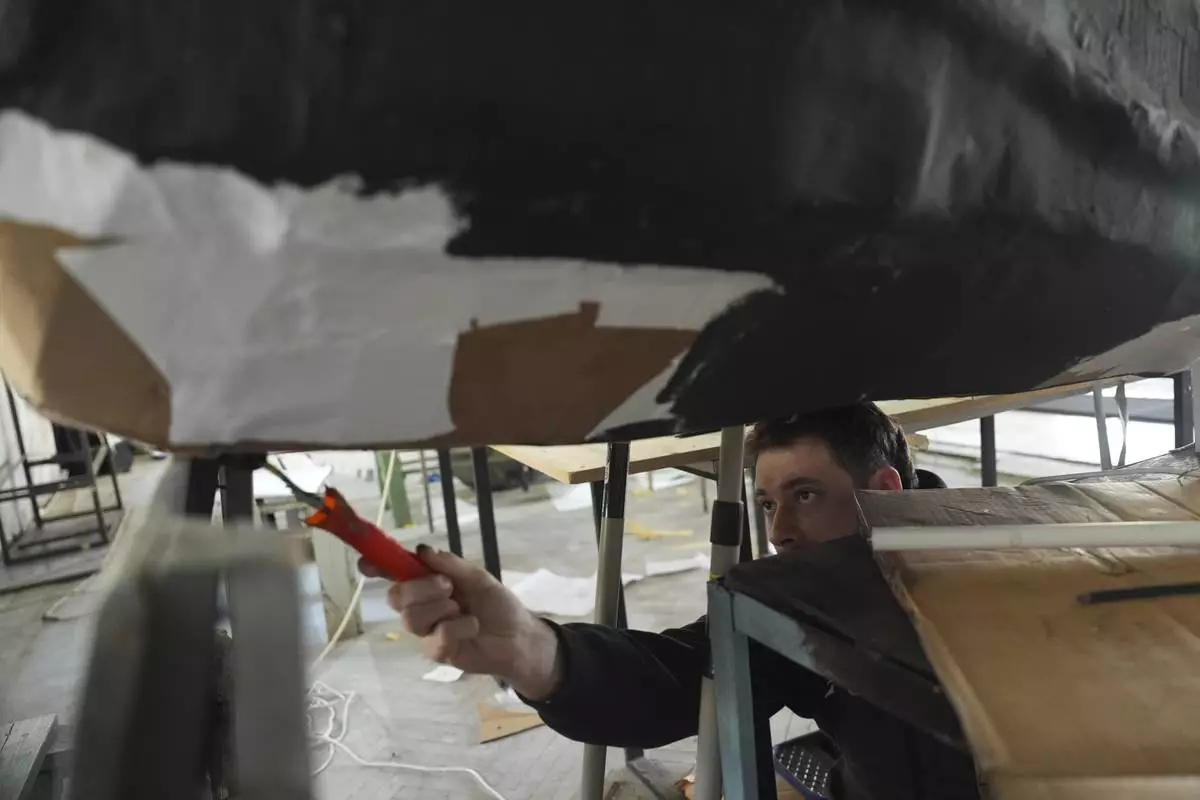
Dani Rupa, from Budapest, Hungary, works on a snake for a demonstration during the COP29 U.N. Climate Summit, Thursday, Nov. 14, 2024, in Baku, Azerbaijan. (AP Photo/Joshua A. Bickel)
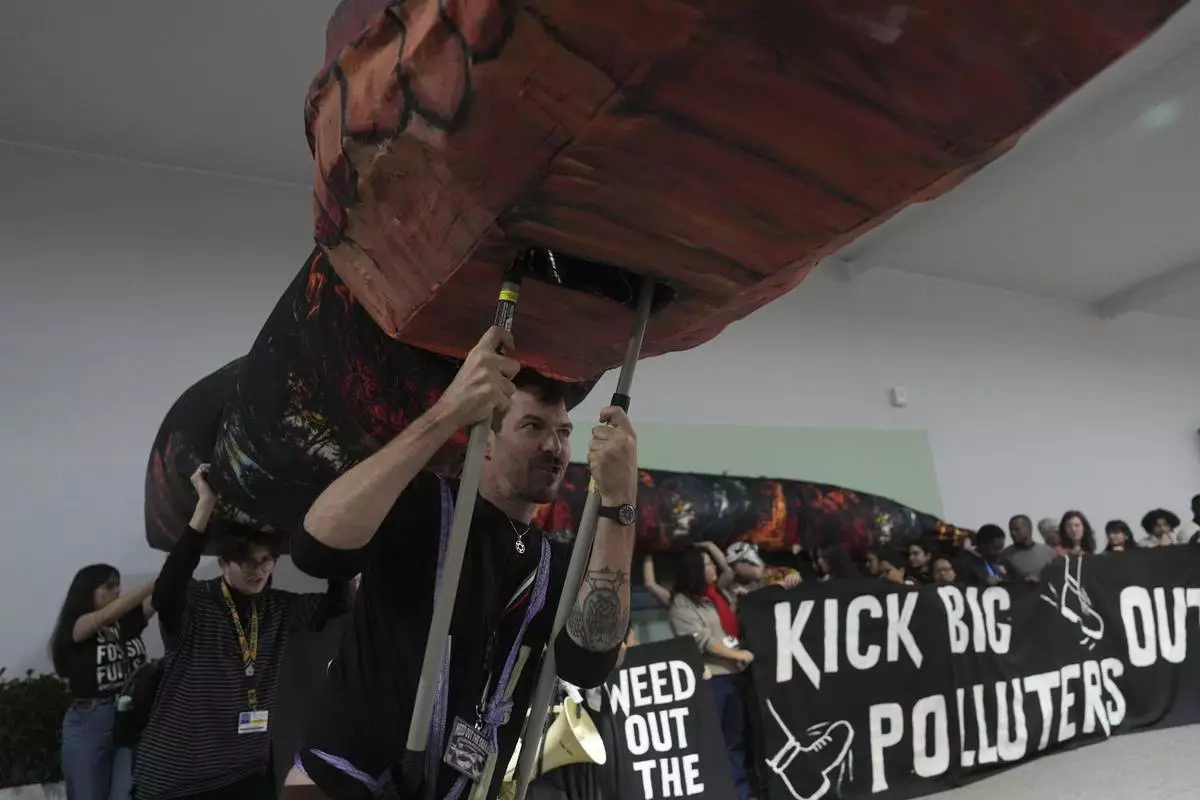
Kevin Buckland, front, and other activists participate in a demonstration against fossil fuels called weed out the snakes at the COP29 U.N. Climate Summit, Friday, Nov. 15, 2024, in Baku, Azerbaijan. (AP Photo/Joshua A. Bickel)
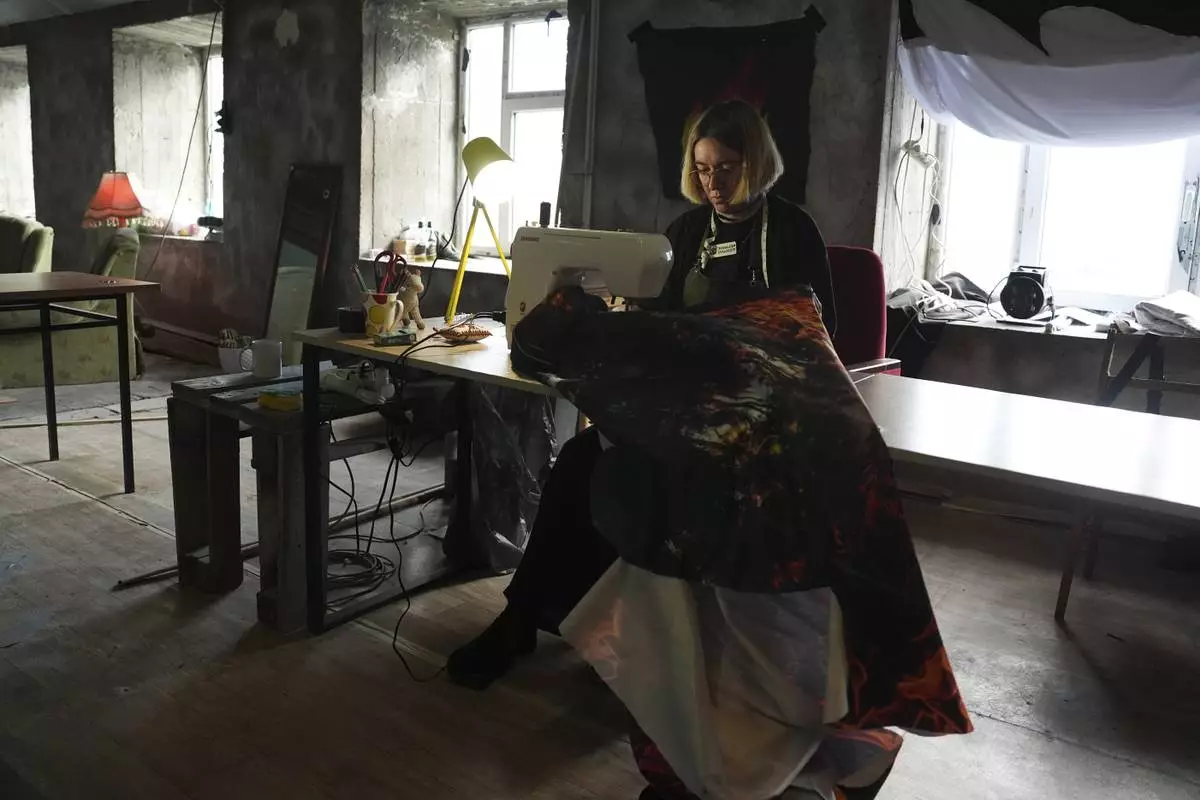
Anna Varszegi, of Budapest, Hungary, works on preparations for a demonstration during the COP29 U.N. Climate Summit, Thursday, Nov. 14, 2024, in Baku, Azerbaijan. (AP Photo/Joshua A. Bickel)
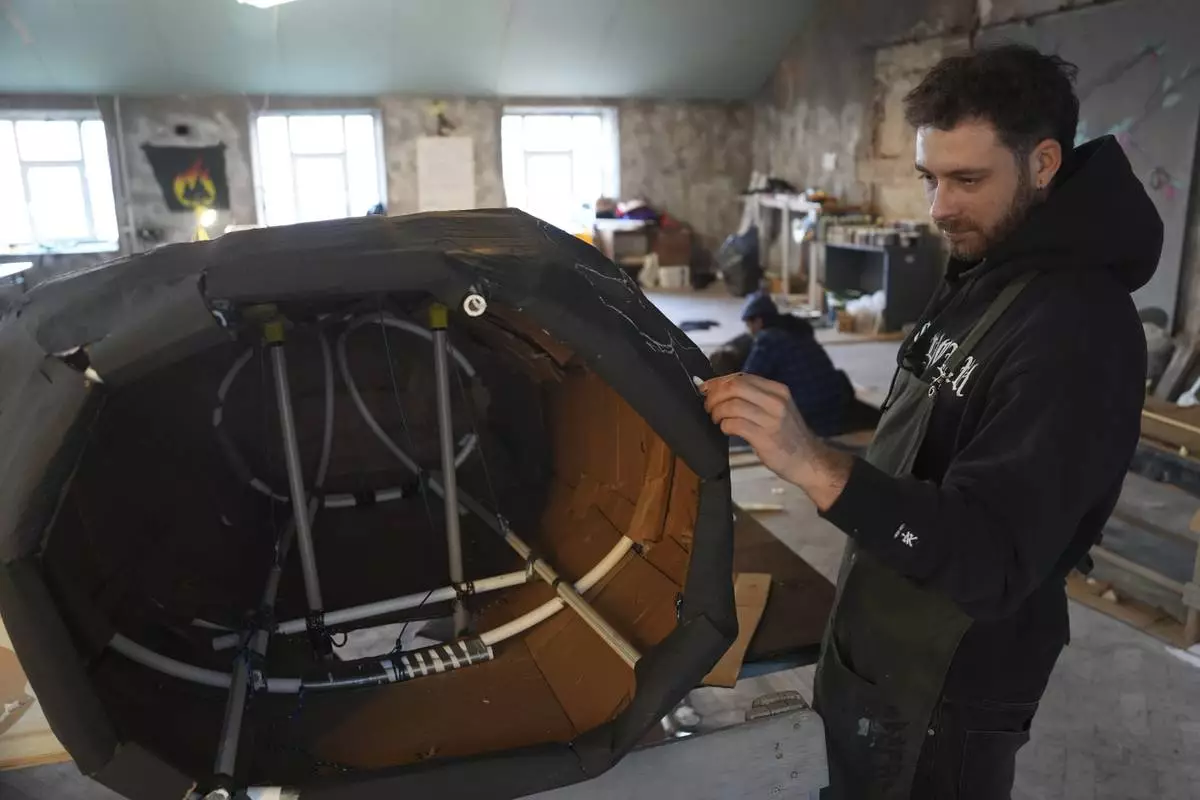
Dani Rupa, from Budapest, Hungary, paints a snake for a demonstration during the COP29 U.N. Climate Summit, Thursday, Nov. 14, 2024, in Baku, Azerbaijan. (AP Photo/Joshua A. Bickel)
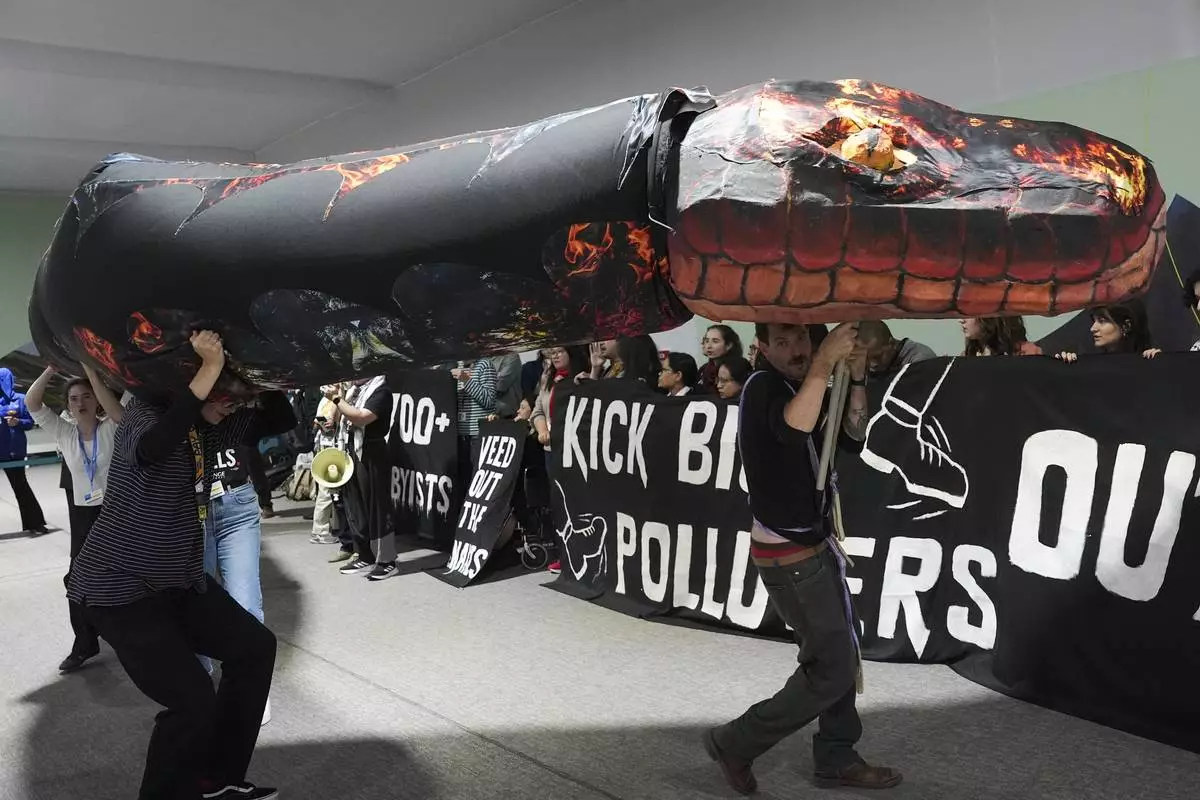
Kevin Buckland, right, and other activists participate in a demonstration against fossil fuels called weed out the snakes at the COP29 U.N. Climate Summit, Friday, Nov. 15, 2024, in Baku, Azerbaijan. (AP Photo/Joshua A. Bickel)
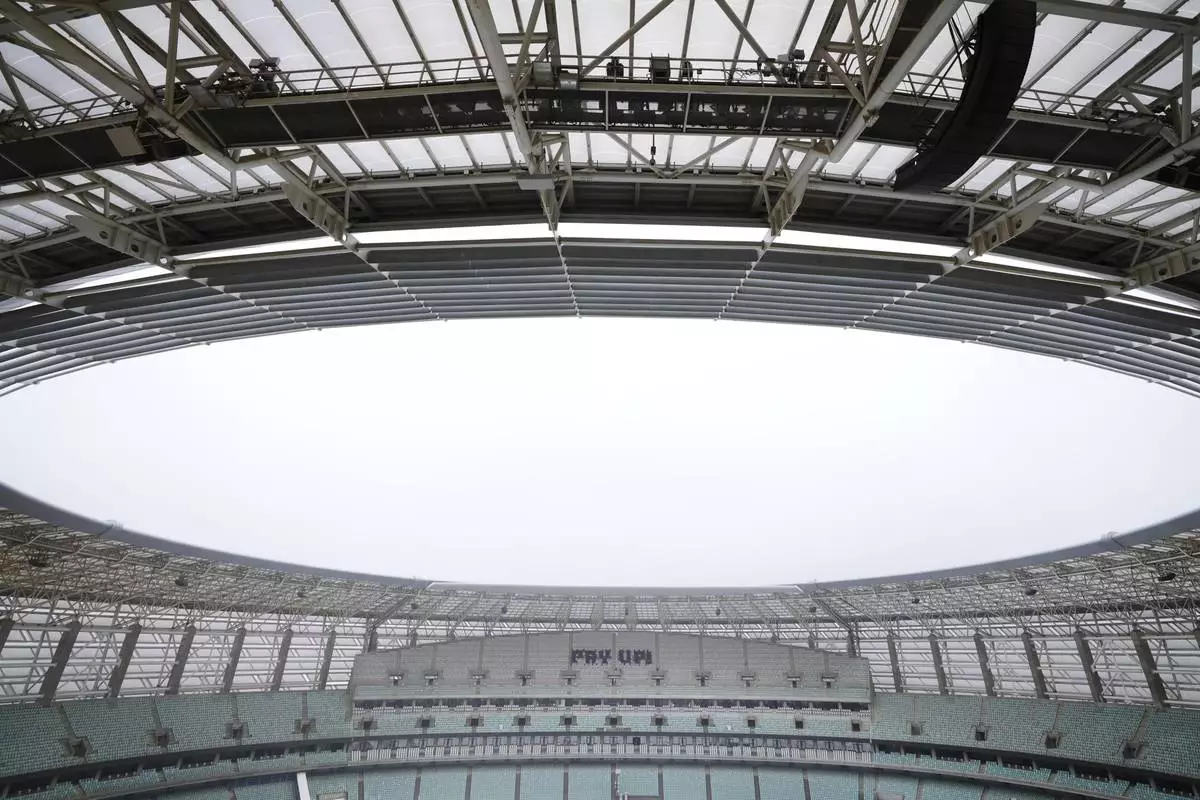
Activists with signs spell out "pay up" for climate finance in the Baku Olympic Stadium during the COP29 U.N. Climate Summit, Thursday, Nov. 14, 2024, in Baku, Azerbaijan. (AP Photo/Sergei Grits)
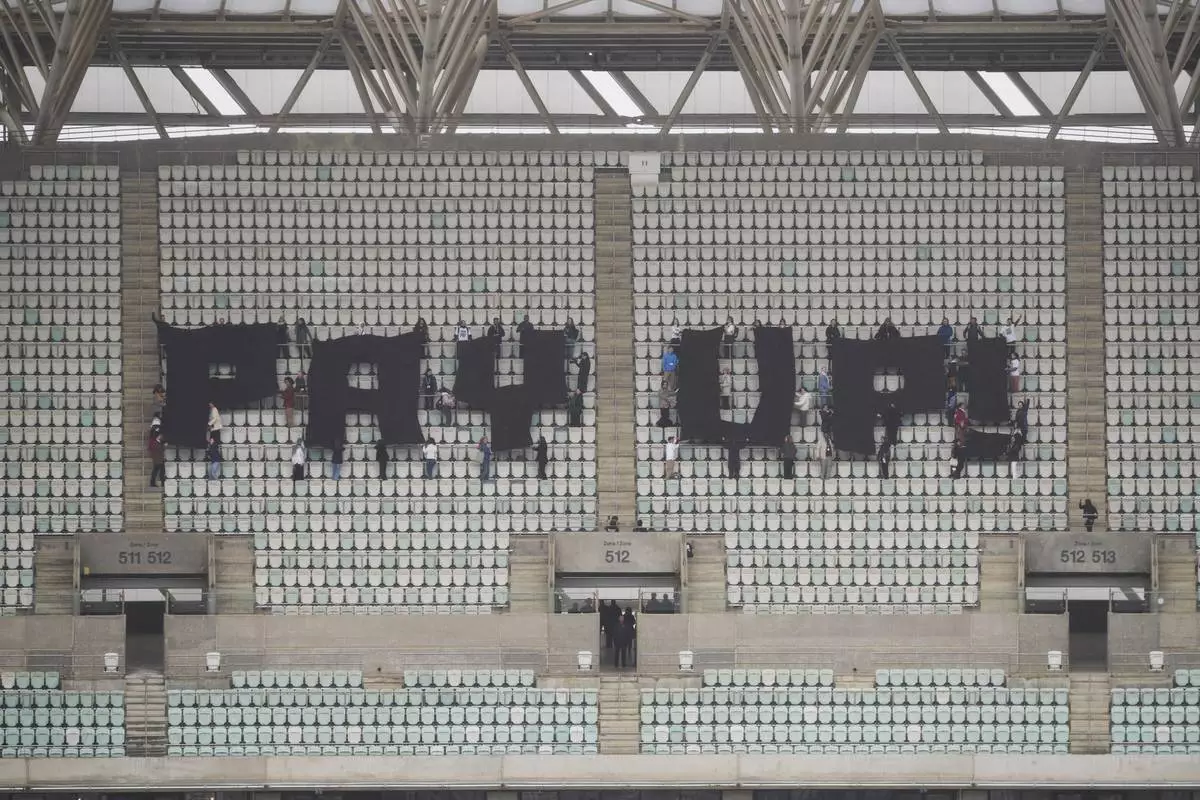
Activists with signs spell out "pay up" for climate finance in the Baku Olympic Stadium during the COP29 U.N. Climate Summit, Thursday, Nov. 14, 2024, in Baku, Azerbaijan. (AP Photo/Sergei Grits)
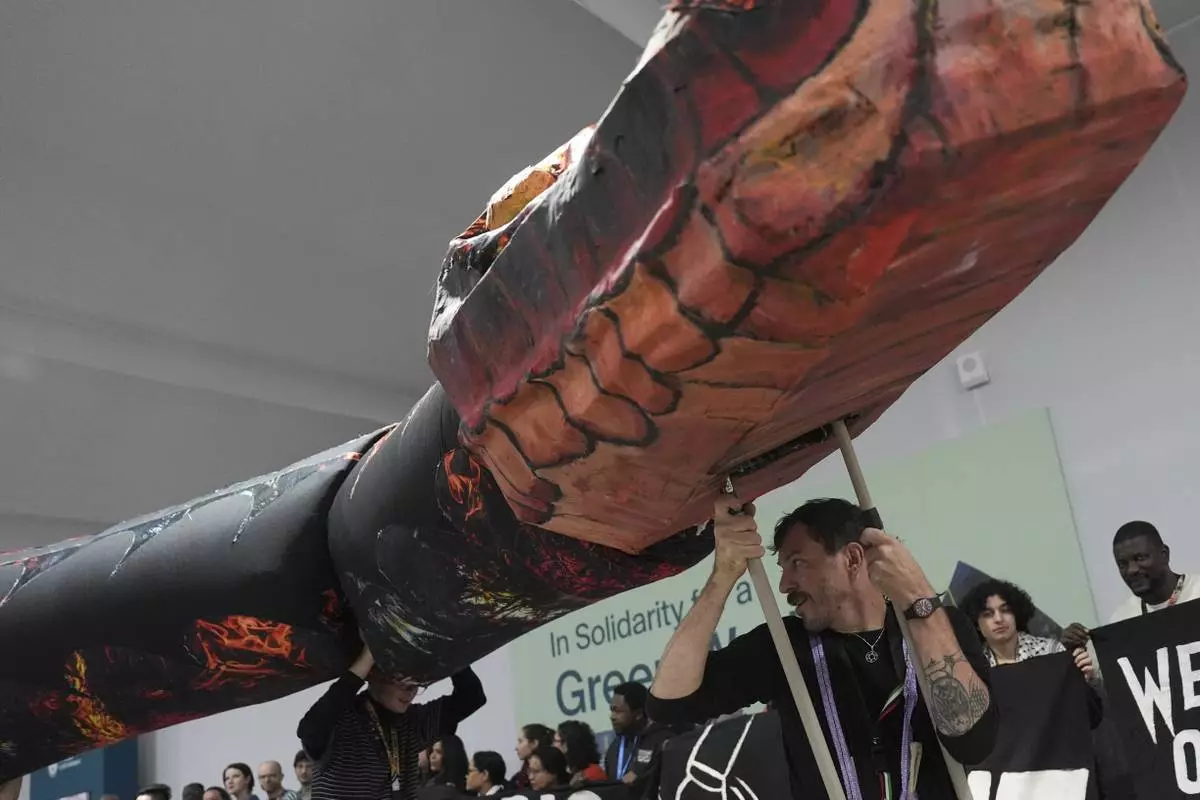
Kevin Buckland, front, and other activists participate in a demonstration against fossil fuels called weed out the snakes at the COP29 U.N. Climate Summit, Friday, Nov. 15, 2024, in Baku, Azerbaijan. (AP Photo/Joshua A. Bickel)
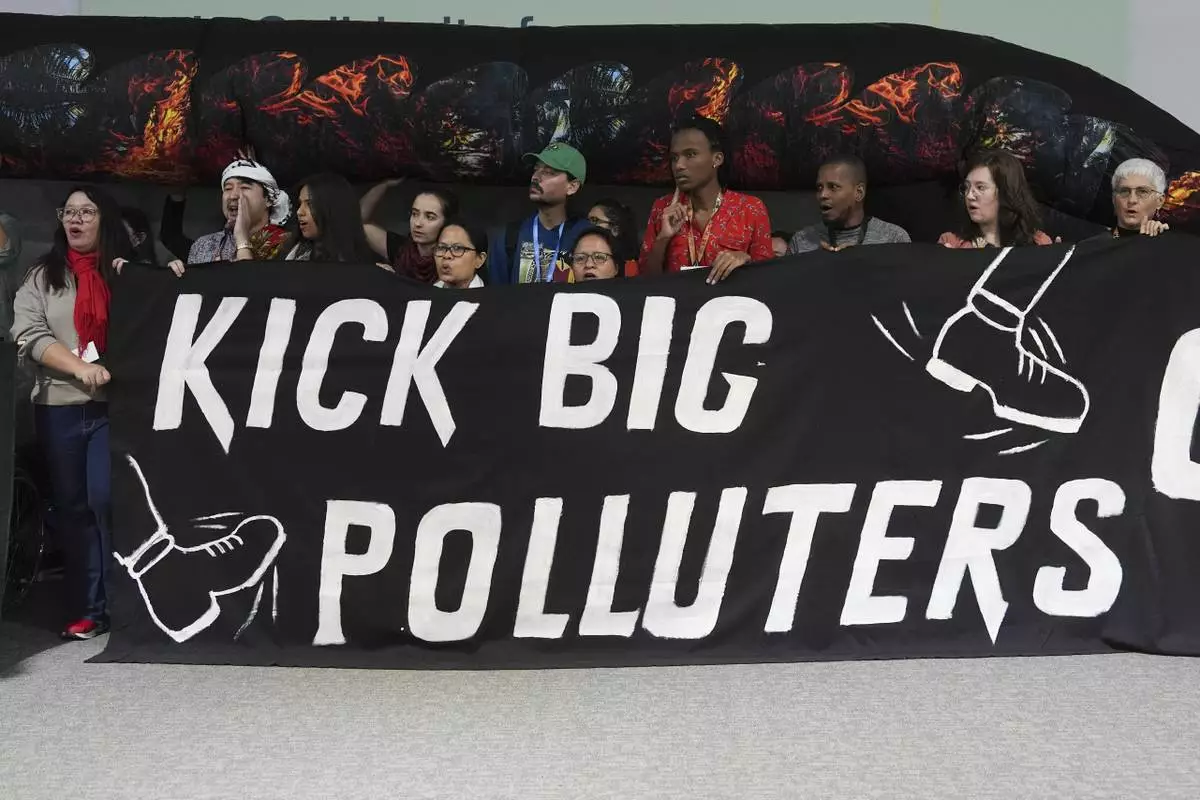
Activists participate in a demonstration against fossil fuels at the COP29 U.N. Climate Summit, Friday, Nov. 15, 2024, in Baku, Azerbaijan. (AP Photo/Joshua A. Bickel)
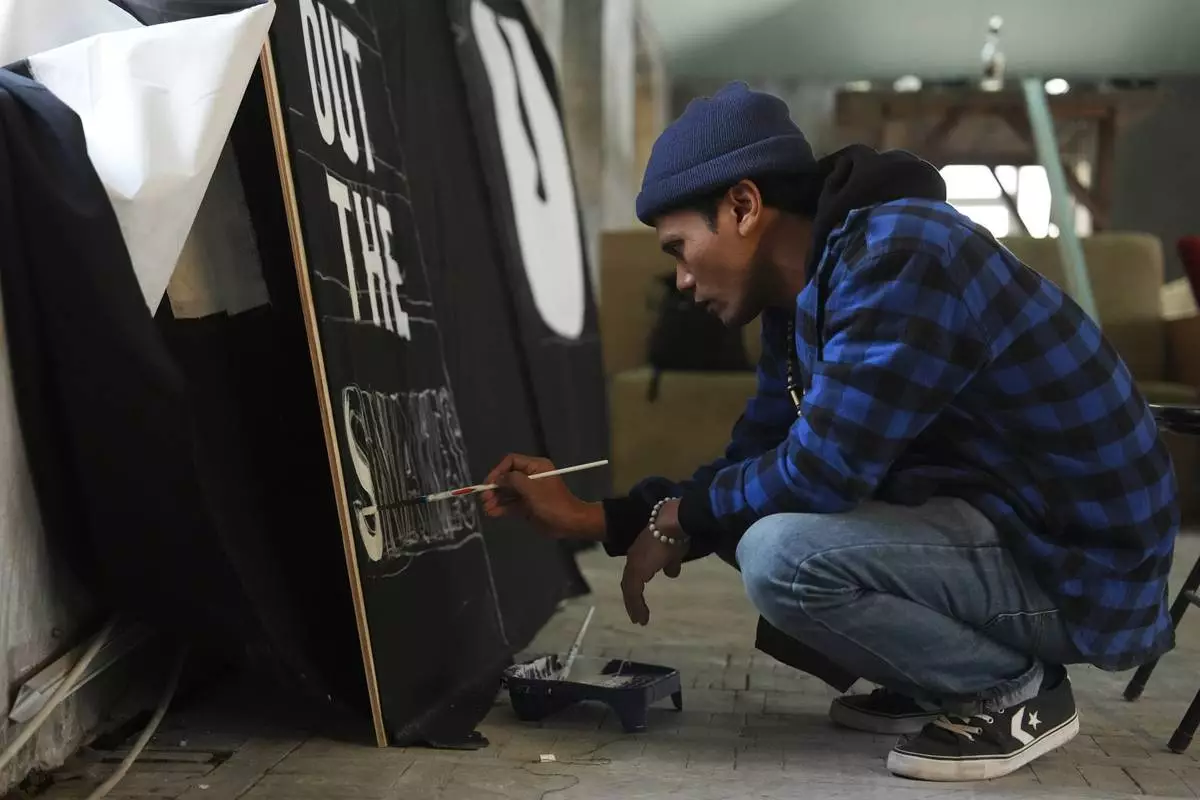
Shaq Koyok, of Malaysia, paints a sign ahead of a demonstration during the COP29 U.N. Climate Summit, Thursday, Nov. 14, 2024, in Baku, Azerbaijan. (AP Photo/Joshua A. Bickel)
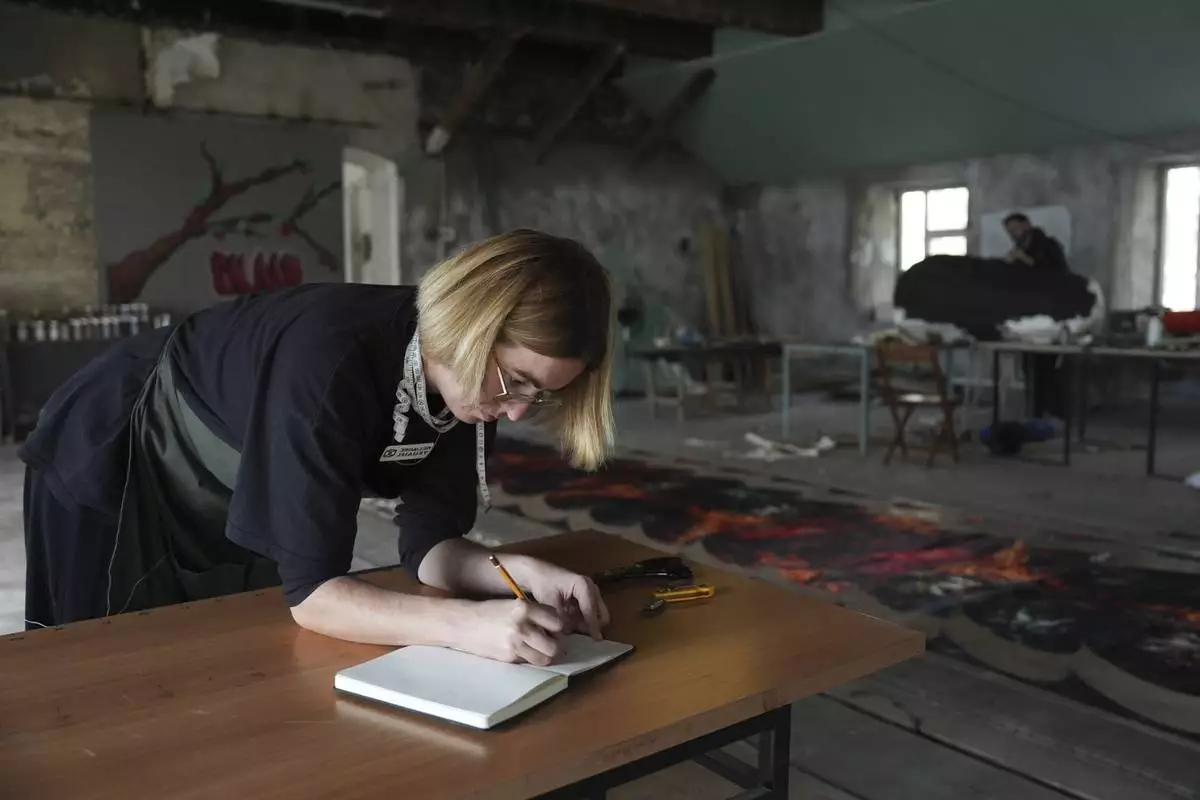
Anna Varszegi, of Budapest, Hungary, sketches out patterns during preparations for a demonstration during the COP29 U.N. Climate Summit, Thursday, Nov. 14, 2024, in Baku, Azerbaijan. (AP Photo/Joshua A. Bickel)
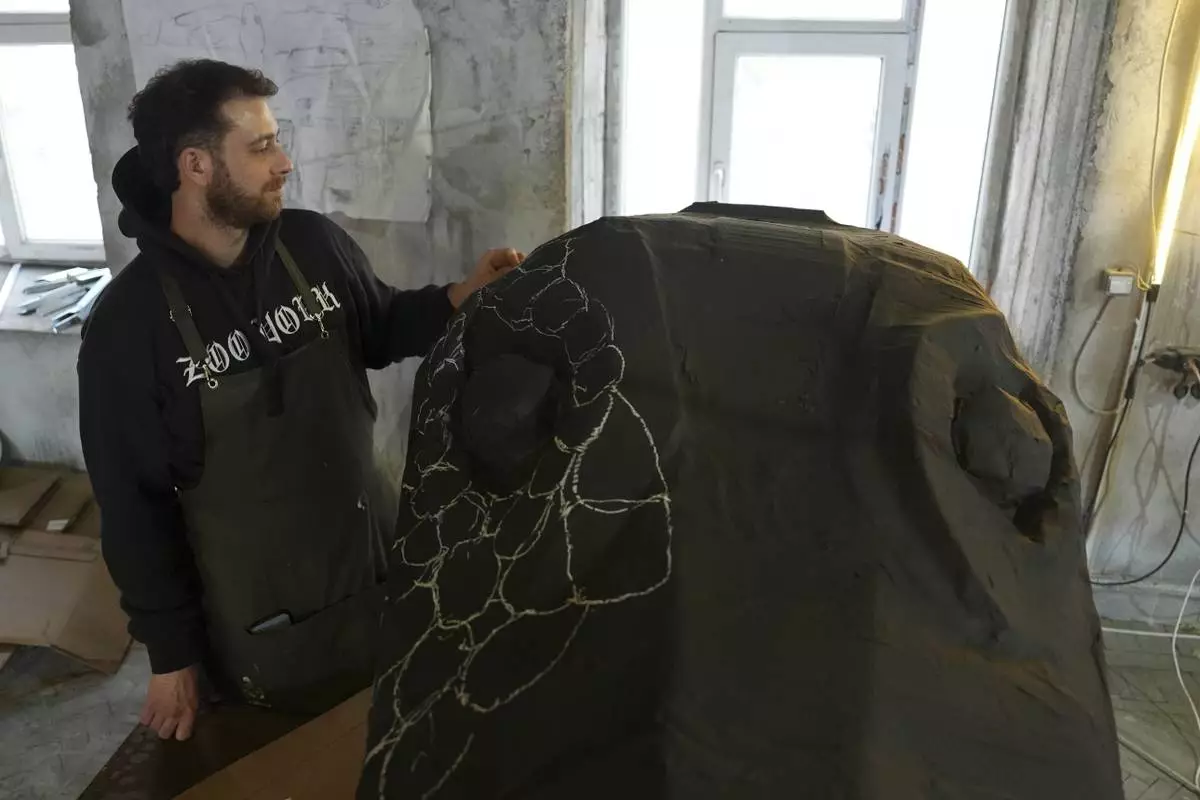
Dani Rupa, from Budapest, Hungary, paints a snake for a demonstration during the COP29 U.N. Climate Summit, Thursday, Nov. 14, 2024, in Baku, Azerbaijan. (AP Photo/Joshua A. Bickel)
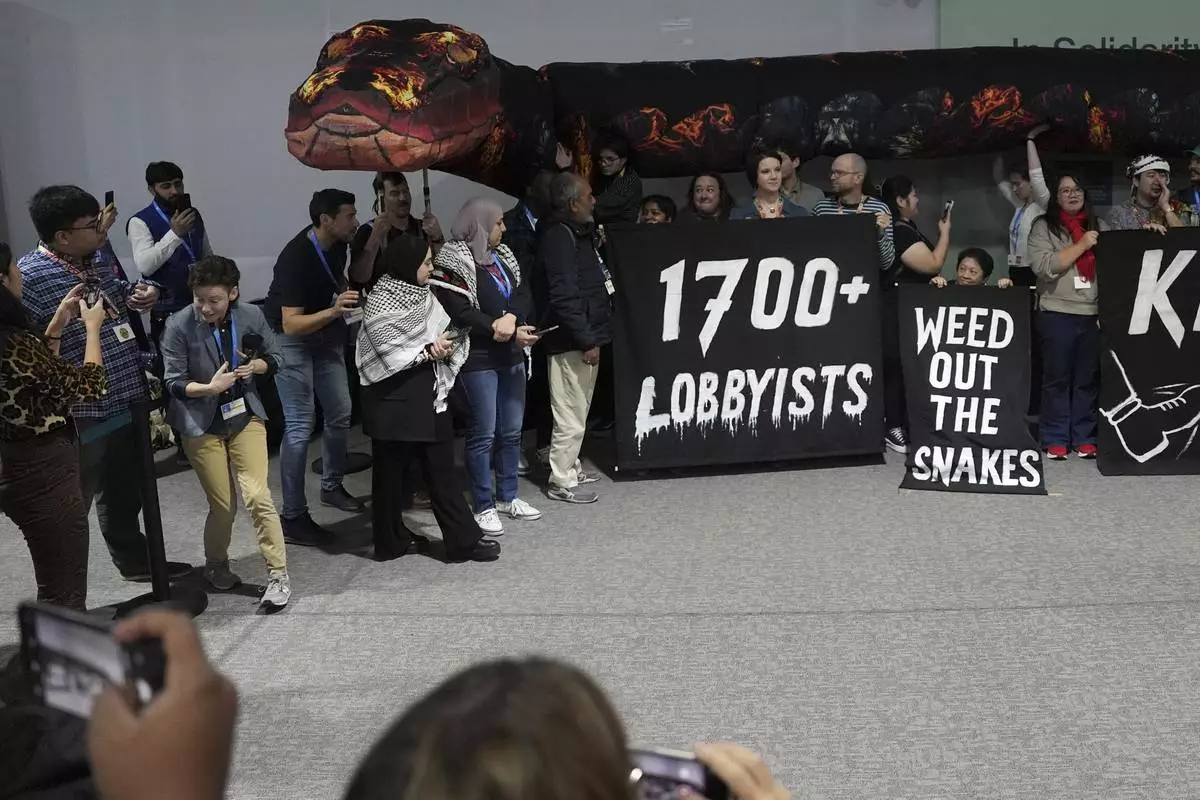
Activists participate in a demonstration against fossil fuels called weed out the snakes at the COP29 U.N. Climate Summit, Friday, Nov. 15, 2024, in Baku, Azerbaijan. (AP Photo/Joshua A. Bickel)



